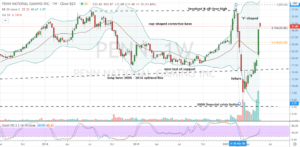Here’s How to Make a Safer Wager on Penn National Gaming Stock
PENN stock has been explosive on the back of a key online sports book partnership
Penn National Gaming (NASDAQ:PENN) has been a hot property on Wall Street. The question is, is now a good time to buy into the PENN stock winning streak? Let’s take a look at what’s happening off and on the price chart and one strategy investors can use without crapping out. Let me explain.

Bullish investors in Penn Gaming have been on a roll since the novel coronavirus’ record-breaking bear market and sensational bottom in late March. Compared to the S&P 500’s burly rally of around 36% or a popular wager in favored stocks like Apple (NASDAQ:AAPL) or Home Depot (NYSE:HD) which have increased investors’ chip stacks by 50% to 100%, shares of the casino operator are stunningly up more than 700%.
Penn’s ascent over the past two months has also been unusually fierce compared to the hard-hit casino industry challenged by high operational fixed costs during the Covid-19 shutdown and now once jam-packed casinos just entering into a new era of socially distanced engagement and rules.
Shares of heavyweights Las Vegas Sands (NYSE:LVS), Wynn Resorts (NASDAQ:WYNN) and MGM Resorts (NYSE:MGM) have rebounded with more or less, market-like returns since March.
Still, each casino’s stock has been struggling around the 38% retracement level of its bear market corrections. By comparison the S&P 500 has just cleared the 62% Fibonacci mark of its corrective move. Yet shares of Penn have just cleared the 76% retracement level. So, what gives?
A Closer Look at PENN Stock
Penn National investors on the right side of the action since the March bottom can likely thank the casino’s investment in Barstool Sports as a primary support for the unusual strength in Penn’s share price.
As InvestorPlace’s Ian Cooper recently wrote, the company’s 36% stake in the online sports betting outfit for $163 million is showing signs of being a well-timed deal for long-term growth.
The partnership is a means for Penn to cash in on the growing, multi-billion dollar trend of online sports by marketing its retail sports book under Barstool Sports when its app launches later this year.
With nearly 40% of all U.S. adults already placing sports bets of some type, Barstools’ growing and key younger demographic base of 66 million could eventually be worth $10 to possibly $25 in equity for PENN stock according to analyst Chad Beynon of Macquarie.
PENN Weekly Price Chart

PENN stock has made a habit of disappointing investors fixated on more classically designed price patterns in 2020. It’s a trend that may also continue.
As the provided weekly chart illustrates, a large and well-formed cup base backed by long-term price support broke out to new highs, but then abruptly failed as the coronavirus became front-page news. And nearly as quick, a certain-looking bearish failure beneath prior support in March set the stage for Penn’s massive rally over the last two months.
In both instances, the house or ‘other side’ of what many might say was the easier trend trade, ended up winning big.
With Penn in the upper reaches of a ‘V-shaped’ base and pattern construction often viewed as technically fraught with risk, placing a bet on further upside momentum makes more sense. And with the 76% level falling to the wayside and weekly stochastics trending higher, the evidence supporting a continued rally appears to be growing.
One strategy for betting on upside in Penn National, but with defined limits on the stock’s momentum, is to use an out-of-the-money bullish butterfly. Essentially, this limited and reduced risk position is wagering on shares to land within a specified range of values in order to profit. A move outside this area results in a smaller loss. It’s a bit like the game of craps in that respect.
Reviewing Penn’s options and shares near $31.15, one such spread that’s favored is the July $35 / $40 / $45 call butterfly for 75 cents. Profits at expiration exist in-between $35.75 to $44.25 with the max capture of $4.25 at $40.
If that were to occur, the 28% gain in shares would produce a return of 567% in the spread. But if shares are below $35 or above $45 at the close of trade on the third Friday in July, this ‘moderately’ bullish investor is out approximately 2.5%.
Disclosure: Investment accounts under Christopher Tyler’s management do not own positions in any securities mentioned in this article. The information offered is based upon Christopher Tyler’s observations and strictly intended for educational purposes only; the use of which is the responsibility of the individual. For additional market insights and related musings, follow Chris on Twitter @Options_CAT and StockTwits.